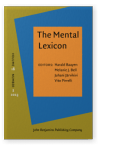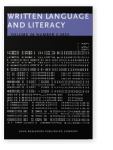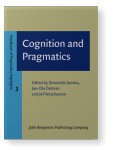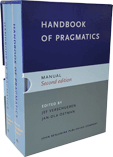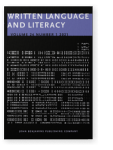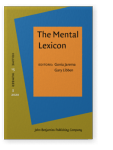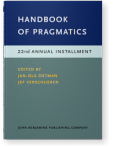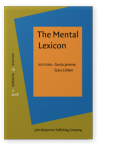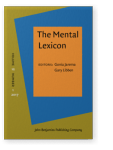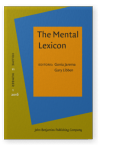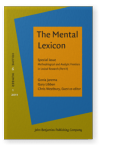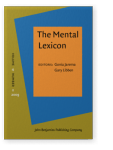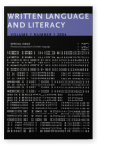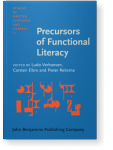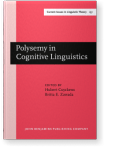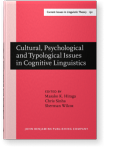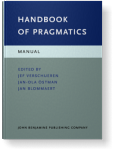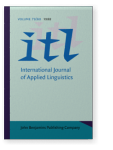Dominiek Sandra
List of John Benjamins publications for which Dominiek Sandra plays a role.
Journals
Title
Cognition and Pragmatics
Edited by Dominiek Sandra, Jan-Ola Östman and Jef Verschueren
[Handbook of Pragmatics Highlights, 3] 2009. xvii, 399 pp.
Subjects Cognition and language | Pragmatics
2024 Intralingual and interlingual effects in a pure language list: Evidence for language-selective lexical access? The Mental Lexicon: Online-First Articles | Article
In various English lexical decision tasks (LDTs), bi-/multilinguals have evinced shorter response times (RTs) for cognates (i.e., words with the same meaning in two languages, e.g., the Dutch-English water) and longer RTs for interlingual homographs (IHs; words with distinct meanings in two… read more
2022 Experimentation Handbook of Pragmatics: Manual, Verschueren, Jef and Jan-Ola Östman (eds.), pp. 1578–1617 | Chapter
2021 The impact of analogical effects and social factors on the spelling of partially homophonous verb forms in informal social media writing Written Language & Literacy 24:1, pp. 1–37 | Article
The present study examines unintentional spelling errors on past participles produced by Flemish teenagers in private online writing. Previous psycholinguistic research on verb spelling errors in Dutch mainly focused on identical homophones (Bosman 2005; Frisson & Sandra 2002; Sandra et al.… read more
2020 From experiment to real-life data: Social factors determine the rate of spelling errors on rule-governed verb homophones but not the size of the homophone dominance effect The Mental Lexicon 15:3, pp. 422–463 | Article
We examine unintentional spelling errors on verb homophones in informal online chat conversations of Flemish adolescents. In experiments, these verb forms yielded an effect of homophone dominance, i.e., most errors occurred on the lower-frequency form (Sandra et al., 1999). Verb homophones are… read more
2019 Orthography and cognition Handbook of Pragmatics: 22nd Annual Installment, Östman, Jan-Ola and Jef Verschueren (eds.), pp. 149–180 | Chapter
2018 Metameric: Interactive Activation at human scale The Mental Lexicon 13:3, pp. 333–353 | Article
An oft-cited shortcoming of Interactive Activation as a psychological model of word reading is that it lacks the ability to simultaneously represent words of different lengths. We present an implementation of the Interactive Activation model, which we call Metameric, that can simulate words of… read more
2017 Poor performance on the retention of phonemes’ serial order in short-term memory reflects young children’s poor reading skills The Mental Lexicon 12:1, pp. 129–158 | Article
The present study aimed to identify crucial factors that underlie phonological representations in short-term memory (STM) of third-graders with different literacy skills. For this purpose, we used the Nonword Repetition Task (NRT) to disentangle the processing of phonemes’ identity and their… read more
2016 The dual role of homophone dominance. Why homophone intrusions on regular verb forms so often go unnoticed The Mental Lexicon 11:1, pp. 1–25 | Article
We investigated whether the effect of Homophone Dominance that has been reported for spelling errors on Dutch verb homophones (Sandra, Frisson, & Daems, 1999) also occurs in perception. This effect was indeed observed: participants in a proofreading experiment overlooked more homophone intrusions… read more
2012 Spelling strategies in alphabetic scripts: Insights gained and challenges ahead Methodological and Analytic Frontiers in Lexical Research, Libben, Gary, Gonia Jarema and Chris Westbury (eds.), pp. 307–336 | Article
2011 Spelling strategies in alphabetic scripts: Insights gained and challenges ahead Methodological and Analytic Frontiers in Lexical Research (Part II), Jarema, Gonia, Gary Libben and Chris Westbury (eds.), pp. 110–140 | Article
2010 Psycholinguistics Handbook of Pragmatics: 2010 Installment, Östman, Jan-Ola and Jef Verschueren (eds.), pp. 1–98 | Article
2009 Psycholinguistics Cognition and Pragmatics, Sandra, Dominiek, Jan-Ola Östman and Jef Verschueren (eds.), pp. 288–368 | Article
2009 Perspectives on language and cognition: From empiricism to rationalism and back again Cognition and Pragmatics, Sandra, Dominiek, Jan-Ola Östman and Jef Verschueren (eds.), pp. 1–15 | Article
2009 Experimentation Cognition and Pragmatics, Sandra, Dominiek, Jan-Ola Östman and Jef Verschueren (eds.), pp. 157–200 | Article
2009 Experimentation Handbook of Pragmatics: 2009 Installment, Östman, Jan-Ola and Jef Verschueren (eds.), pp. 1–55 | Article
2009 Frequency and analogical effects in the spelling of full-form and sublexical homophonous patterns by 12 year-old children The Mental Lexicon 4:2, pp. 239–275 | Article
Two experiments in which 12-year old children had to spell Dutch inflected verb forms are reported. Both experiments focus on homophone dominance, i.e., the fact that spellers tend to make more intrusion errors on the lower-frequency form than on the higher-frequency one. Homophone-induced errors… read more
2004 Still errors after all those years ...: Limited attentional resources and homophone frequency account for spelling errors on silent verb suffixes in Dutch Process and Acquisition of Written Language, Schreuder, Robert and Ludo Verhoeven (eds.), pp. 61–77 | Article
We review some of our research findings on verb spelling errors in Dutch. The spelling of Dutch regularly inflected verb forms is governed by rules of the simple concatenative type (stem + suffix). The spelling of a subset of these verb forms is determined by morpheme-based analogy, both at the… read more
2002 The role of orthographic onset-rime units in Dutch beginning readers Precursors of Functional Literacy, Verhoeven, Ludo, Carsten Elbro and Pieter Reitsma (eds.), pp. 49–67 | Article
2001 Processing Polysemous, Homonymous, and Vague Adjectives Polysemy in Cognitive Linguistics: Selected papers from the International Cognitive Linguistics Conference, Amsterdam, 1997, Cuyckens, Hubert and Britta E. Zawada (eds.), pp. 261–284 | Article
1999 Prepositional semantics and the fragile link between space and time Cultural, Psychological and Typological Issues in Cognitive Linguistics: Selected papers of the bi-annual ICLA meeting in Albuquerque, July 1995, Hiraga, Masako K., Chris Sinha and Sherman Wilcox (eds.), pp. 107–128 | Article
1995 Experimentation Handbook of Pragmatics: Manual, Verschueren, Jef, Jan-Ola Östman and Jan Blommaert † (eds.), pp. 590–595 | Article
1988 Is Morphology used to encode Derivations when Learning a Foreign Language? ITL - International Journal of Applied Linguistics 79/80, pp. 1–23 | Article
Derived words suggest a very efficient mnemonic when they have to be learnt as items in a foreign language (FL). They could be remembered by tagging in semantic memory the property that is lexicalized by the stem and storing the particular affix. A learning experiment was designed to find out… read more
